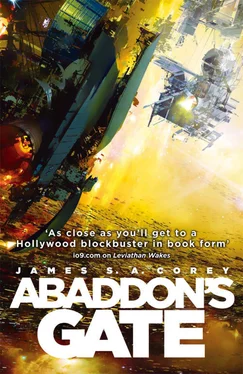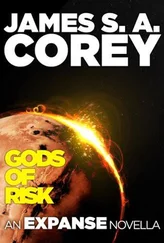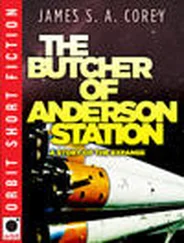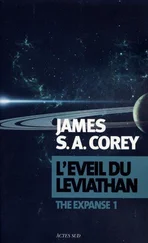“Stanni? Solé?” she said into her hand terminal. “Hold it together for me here. I’ve got a thing I need to do.”
She waited for the inevitable questioning, the prying and suspicion.
“Okay,” Soledad said. And that was all.
At the hangar, Melba authorized the flight of her shuttle, waited ten minutes for clearance, and launched out the side of the Thomas Prince and into the black. The shuttle monitors were cheap and small, the vastness of space compressed into fifty centimeters by fifty centimeters. She had the computer figure the fastest burn for the Cerisier . It was less than an hour. She leaned into the thrust like she was riding a roller coaster and let the torch engines burn. The Cerisier appeared in the dusting of stars as a small gray dot that hurtled toward her. The ship, like all the others in the flotilla, was in the last of the deceleration burn to put them at the Ring. Somewhere out past all the glowing drive plumes, it waited. Melba pushed the thought from her mind. It made her think of Stanni and Soledad and their quiet fears. She couldn’t think of them now.
Impatience to arrive made it hard to start the flip and the deceleration burn. She wanted to get there, to be there already. She wanted to speed into the Cerisier like a witch on a broom, screaming in at speeds that wouldn’t have been possible in atmosphere. She waited too long, and did the last half of the jump at almost two g. When she docked, she had a headache and her jaw felt like someone had punched her.
No one asked why she was back early and alone. She listed personal reasons in the log. Walking through the cramped corridors, squeezing past the other crewmen, felt oppressive, familiar, and comforting. It took coming back to recognize how much the wider spaces of the Thomas Prince had bothered her. It felt too much like freedom, and she was all about necessity.
Her cell was a mess. All of her things—clothes, terminal jack, tampons, communications deck, toothbrush—were scattered on the floor. She’d have to find a way to secure them all before the burn stopped, or they’d be floating out into the corridor. People would wonder why they weren’t packed away. She let herself glance at the metal door under her crash couch. A tiny golden curl of sealant foam stuck out from one corner. She’d get some kind of mesh bag and some magnets. That would do. It didn’t matter. That was later. Nothing later mattered.
She picked up the comm deck, turned it on. Ping times to the Rocinante were under thirty seconds. Melba loaded the sequence she’d been waiting to load for months. Years. It was a short script. It didn’t take a second to prompt her to confirm.
The fear was gone. The hatred was too. For a moment, the tiny room was filled with a sense of having just woken from a dream, and her body felt relaxed. Almost light. She’d come so far and worked so hard, and despite all of the mistakes and screwups and last-minute improvisations, she’d done it. Everything in her life had been aiming toward this moment, and now that she was here, it was almost hard to let it all go. She felt like she was graduating from university or getting married. This moment, this action that fulfilled all the things she’d fought for, and then her world would never be the same.
Carefully, savoring each keystroke, she put in the confirmation code—jules-pierre mao—and thumbed the send button. The comm deck LED glowed amber. At the speed of light, a tiny packet of information was pulsing out, hardly more than a bit of background static. But the software on the Rocinante would recognize it. The communications array on Holden’s ship would be slaved to the virtual machine already installed and impossible to stop without scraping the whole system clean. The Rocinante would send a clearly recognizable trigger code to the Seung Un , wait fifty-three seconds, and announce Holden’s responsibility and his demands. And then the virtual machine would power up the weapons and targeting systems. And nothing, no power in the universe, could stop it from happening.
The comm deck got the confirmation response, and the amber LED shifted to red.
Bull’s hand terminal sat on the cart’s thin plastic dashboard, jiggling with every bump in the corridor floor. The siren blatted its standard two-tone, scattering people from his path and calling them out behind him. If they didn’t know yet, they all would in minutes. The death of the Seung Un wasn’t the sort of thing you could overlook.
On the small, jittering screen, the destroyer exploded again. At first it was only a flicker of orange light amidships, something that could have been electrical discharge or a gauss gun finishing its maintenance regimen. Half a second later, sparkles of yellow radiated out from the site. Two seconds after, the major detonation. Between one frame and the next, the destroyer’s side bloomed open. Then nothing for ten full seconds before the fusion reactor core emerged slowly from the back, brighter than the sun. Bull watched the intense white gases begin to diffuse out and fade into a massive golden aurora, a drop of gold losing cohesion in the oceanic black.
He looked up to make the turn onto the ramp that would take him back to the office. A young man ambled slowly out of his path, and Bull leaned on the cart’s horn.
“There’s a siren,” Bull yelled as he passed the young man, and got an insolent nod in reply.
“Okay,” Serge said from the terminal. “We’re getting the first security analysis. Best guess, something blew out in one of the power conduits, fused the safety systems so they couldn’t shut it down. Would have taken about that long to turn the whole starboard main circuit to molten slag.”
“What blew?” Bull demanded.
“Probably a maneuvering thruster. About the right place for one. Get it hot enough, water skips steam and just goes straight to plasma. Cuts right through the bulkheads around it.”
Bull turned the cart around a tight corner and slowed to let a half dozen pedestrians get out of his way.
“Why’d they dump core?”
“Don’t know, but probably they thought they’d lose containment. They got six ships diverting now to keep from plowing into that mierda.”
“If they’d lost containment it’d be worse. They’d be diverting to avoid bodies and shrapnel. Are there survivors?”
“Yeah. They’re putting out the distress request. Medical and evacuation. Sounds pretty fucked up, que no?”
“What about trace data. Can we tell who shot ’em?”
“No one shot ’em. Either it was a straight accident, or…”
“Or?”
“Or it wasn’t.”
Bull bit his lip. An accident would be bad enough. People on all sides of the system’s power structure were on edge, and a reminder that Earth’s fleet was aging and poorly maintained wouldn’t make anything easier. Sabotage would be worse. The closest thing to good news was that everyone had seen it and there wouldn’t be any accusations of enemy action. If there’d been a gauss round or a lucky missile that had slipped through the Seung Un ’s defenses undetected, the scientific mission could turn into a shooting war faster than Bull wanted to think about.
“Are we offering assistance?” Bull asked.
“Give us a breath, boss,” Serge said. “Ashford ain’t hearing any of this faster than us.”
Bull leaned forward, his hands wrapping the steering controls until his knuckles went white. Serge was right. What happened outside the ship was Ashford’s problem. And Pa’s. He was security chief, and he needed to think about what needed doing inside the Behemoth . People would be scared, and it was his job to make sure that fear didn’t turn into hysteria. Watching a ship blow out—even an enemy ship—reminded everyone how tenuous life was with only a thin skin of steel and ceramic to keep the vacuum at bay. It reminded him. The cart hit a larger bump than usual, and his hand terminal slipped onto its side.
Читать дальше












